- Home
- Phil Geusz
Admiral (The David Birkenhead Series) Page 3
Admiral (The David Birkenhead Series) Read online
Page 3
It wasn't until I was forced to abandon the slavery-ending and Rabbit-empowering part of my job and focus exclusively on the war again that I realized just how rewarding it'd been to help resolve serious problems without having to kill anyone or blow anything up along the way. I not only had to vacate chair after chair right when they needed me most, but I couldn't even leave Nestor behind in my stead. His Majesty was absolutely correct in regards to he and I being an effective team as well as best friends, and I'd learned long ago that one of the worst things about war is the way it gives birth to imperatives that simply cannot be ignored, no matter what the natural order of things might otherwise be. I needed Nestor at my side, and that was that. If this meant that my fellow ex-slaves would have a less successful transition to freedom than they otherwise might, well... That was the sort of miserable price that war exacted, over and over and over again. The best thing for everyone would be to end the fighting as soon as possible. And so, one last time, Nestor prepared to ship out in the cramped aide's quarters next to mine. This time around, however, I swore I'd bust anyone who referred to His Lordship as my "cabin bunny" down two full ranks. So help me, I would!
Killing off an already dying enemy might appear to be a simple matter, and I suppose it's exactly that if one is referring to a single expiring soldier experiencing difficulties in grasping the fact that his battle is over. When the enemy is an entire nation, however, or even worse a coalition of worlds, well... The difficulties grow to monstrous proportions almost immediately. You can't just stop a society in its tracks and say "Do things this way from now on!"—the problems associated with manumission alone on the Royal worlds attested to how difficult it was to impose a change in the basic social order. And the collapse of an empire wasn't something one could afford to mismanage, or else millions or even billions might die of starvation, rioting, lack of breathing-air deliveries... any one of a million little things that might go wrong during the period when so many applecarts were being upset. Even worse, it was statistically certain that many of these things would go wrong anyway despite our best efforts no matter how hard we worked and how sincere our efforts were to avoid needless suffering.
And all that was even before it was time to think about defeating the enemy's remaining military forces!
In the end, I found that it was impossible to do any really creative thinking at Navy Headquarters. Yes, this was where most of our best minds were stationed, and it was definitely the proper place to work out issues such as estimating how much food we were going to have to transport into the Empire as we liberated it and where we were going to find enough shipping to sustain such an effort until the cessation of hostilities hopefully ended our difficulties. But as for issues like which planets to secure first and how best to secure them... I found I worked far more effectively at my country estate, pacing back and forth wearing nothing but a bathrobe while Nestor force-fed me tea and acted as a sounding-board to bounce ideas off of. I also invited lots of visitors—Professor Lambert dined with us more times than I can remember, for example, and in truth our final strategy owed much to him. "Wars are about fighting and sacrifice," he reminded me over and over again when I got too bogged down over potential Imperial countermoves. "But peace is about prosperity and personal growth. The war is won, David. Wage peace, albeit with caution, and the Empire won't ever land another telling blow."
The more I thought about it, the more obvious it became that he was right. So I ordered the fleet to split in half and concentrate at two mutually-supporting locations selected most carefully by the Professor and myself. What was left of the Imperial Battle Line, both he and I judged, was incapable of defeating either Royal division except via either an amazing stroke of luck or incompetence of an extraordinarily high order of magnitude. Besides, it was far more likely that they'd save their ships to serve as negotiating chips than throw them away in a hopeless counterattack. The other brass hats screamed bloody murder at this contravention of their most sacred tenet, total concentration of force. But orders were orders for them as well. It'd take months for the actual ship-movements to take place, but once they did the Imperials would effectively be sealed in a sort of little box that contained their major industrial and technological centers, but not a lot in the way of food or natural resources. If their fleet—which was and would indefinitely remain in a far worse state of operational readiness than our own—did indeed seek a fight, one or the other wing of our own Battle Line would be in position to swoop in and most likely defeat it. Even if the Imperials by some freak won the first round, they'd certainly be so damaged as to be totally unable to stand up to an inevitable second engagement with our remaining forces when they came racing to the rescue.
"We should keep the battleships together and break directly into Imperious's home space," one group of staff admirals protested in a memo. "This would force yet another battle on terms highly unfavorable to our enemies, and remove them forever as a spaceborne threat." Well… They were correct in their way, and I'd heard worse strategies proposed in my life. But what a terrible waste of lives it'd be, to fight another fleet action! And if we followed that course there'd have to be invasion after invasion, till the Empire's planets ran crimson with the blood of her populaces. While I could and certainly would go down that road if I absolutely had to, well... I rather thought it didn't have to come to that. To a man who has only a hammer in his toolbox, every fix is a nail. But the Professor had taught me about screwdrivers and adhesives as well as concentration of force, and as a result I could see other options. No, I'd not blindly pound, pound, pound away until I created a desert where once there'd been a multitude of green healthy worlds. It'd be criminal, so long as more humane options remained on the table. Though I'd be fully ready to fight and win if it proved absolutely unavoidable, I very much hoped that not even one more major battle would be necessary. Further fighting should be avoidable so long as there was even a trace of high-placed decency and humanity left in the Empire.
Which, of course, I knew for a fact that there was.
5
"…and so," I concluded as the other ship-captains, officers and flag-officers of my brand-new Third Fleet sipped at their drinks. This was to be our last chance to meet all together in one room, and James had not only lent us part of the Palace but had also agreed to attend himself so as to underscore the deadly seriousness of it all. "It may seem to you like we're over-officered and over-staffed. Frankly we will be, at first. But if everything goes according to plan I'm going to be leaving handfuls of ships at every successful stop. Many of these will be fencible ships—most, in fact—and while of course I have nothing but the highest regard for the irregular navy—" I smiled for a moment to let them remember why "—it's possible that problems may develop after the bulk of the fleet has departed that will require a more seasoned hand. So, we're bringing extra flag-officers."
A little murmur of conversation erupted, and I met His Majesty's eye at the other end of the long table as I waited for it to die down. James was sitting impassively, as befitted a monarch at such a function. His approval of the proceedings was reflected by his mere presence; it was understood that it wasn't his place to interfere in day-to-day navy business. "Sir?" a rear-admiral whose name I'd forgotten—Tsing, perhaps?—asked me. "Won't such small forces be easy prey for any Imperial cruiser division that might wander along?"
I forced a smile in return, having answered this question dozens of time already. Even James had asked it. Couldn't they see that their eternal bogeyman was finally dead? "There won't be any Imperial cruiser forces wandering about," I replied. "There can't be any left by now, with our enemy's homeworlds sealed off so tightly. Nothing flying Imperial colors can still be battleworthy after so long without maintenance."
"Except a raider similar in concept to Richard," the newly-minted Lord Blaine added with a smile. His Lordship might still be insufferably vain and title-conscious, but he'd stood by me when it mattered at Wilkes Prime and while he wouldn't be exercising
any of the independent commands I'd just mentioned there'd always be room in my command for Blaine anyplace I could keep a close eye on him. "Or Javelin. But David here torpedoed the Imperial Javelin-equivalent in drydock at Imperious, and we'll be leaving plenty enough force to dispatch any Richard-type raiders."
The rear-admiral scowled. "I don't like this fleet-division business, sir," he continued. "Dividing the Battle Line was bad enough, and creating a Third Fleet out of the leftover dribs and drabs was even worse. But now you say that you intend to break us up into penny-packets!"
I held my face impassive, even though I felt like screaming. What I was doing was restoring the navy to its traditional peacetime structure and role, keeping local space safe from what amounted to pirates. We didn't need huge, concentrated fleets of ships of the line to accomplish that mission. James and I planned to cover a large part of the upcoming manumission expenses via scrapping most of the larger vessels and adopting the fencible system in peacetime to reduce costs even further. Had we been at war so long that our admirals had forgotten what peace was like? "You can call them penny-packets if you like," I replied slowly. "But as His Lordship just pointed out, these groupings are perfectly appropriate to the new threat level."
"They'll be orbiting Imperial worlds!" another admiral pointed out. "With nowhere to go for resupply or repair if the population changes sides again, sir!"
"If a formerly—" I emphasized the word heavily—"Imperial world changed sides again," I replied calmly, "the local squadron's only duty will be to escape and report the fact to me." I let my eyes grow hard, then met those of my officers one by one. "After that, further decisions regarding what responses might or might not be appropriate will be my responsibility, and mine alone."
"They won't like that part very much," James added from the table's head. Apparently he felt I needed further support, which was a bit irritating. But it was also welcome, I had to admit. The more senior the officer, it seemed, the more difficult it was for them to understand what it meant to wage peace.
"No, Your Highness," I answered him. "They won't. You have my personal word of honor on that. And so will they."
There was another long silence; eventually I filled it. "Anyway… That's the basic plan. We'll proceed from one planet to another with our merchantmen in tow, filled to the gills with foodstuffs and metals and luxuries we suspect the outlying Imperial worlds haven't seen in years or perhaps even decades. Each will be offered the choice of surrender and free trade or invasion and massive slaughter. If they accept our terms we'll assume their leaders are men of honor, send a Royal Governor and their staff dirtside along with any other experts that may seem appropriate, and move on. If they turn us down we won't invade them regardless—we don't have enough time or treasure for that sort of nonsense anymore. We'll simply blockade them as best we can with cheap fencible ships and maybe a cruiser for backup and let them stew in their own juices a few more years. Then we'll try again and find out if they see things differently, with the Empire by then long gone everywhere else."
There was another endless silence. "No invasion, sir?" a captain finally asked. He sounded offended at the idea.
"No," I replied. "What have we to gain by landing marines, save for a few years worth of uncollected taxes that won't amount to a fraction of the expenses involved?"
"To which Houses will the surrendered planets eventually be awarded?" a commodore wearing a Hashimoto emblem wanted to know. "Only a King's world is administered by a Royal Governor." His eyes narrowed. "How many are already allotted to Marcus, for example?"
I felt my ears lower themselves for a fight, but before I could reply James spoke up again. "That issue is strictly for the House Lords and I to work out among ourselves," he explained. "My control will be temporary in almost every case. There's no plan whatsoever in place yet, though it's fair to predict that most of the surrendered worlds will be returned to their original owners. I've also empowered David to invite the owners of the Empty Chairs to return. If they so choose, they'll be included in the discussions and therefore also the redrawing of boundaries."
"Our mission," I repeated—I'd already said it four times so far, and clearly it needed to be said again—"isn't one of vengeance or conquest. It's the re-establishment of peace and unity under a single sovereign." This was as good a place to wrap things up as any, I decided. So I looked at James and, while it was a slight breach of protocol for me to make the toast myself rather than the lowest-ranking officer present, raised my teacup. "Long live the King!" I declared.
"Long live both Their Majesties!" Lord Blaine corrected me as he and the rest scrambled to their feet, and my ear-linings turned dark red. Oh my heavens! I'd actually forgotten!
"To them both!" Nestor agreed, raising his own cup. Then I clumsily sat back down as James grinned at my gaffe and a fair proportion of the upper command level officers of the Royal Navy drank to the health of my brother and I alike.
6
"I should've anticipated suspicion and misunderstanding, with all the Houses out for themselves again just as soon as there's no Empire to hold them together," I muttered to Nestor as I paced up and down across Javelin's deckplates. I was having to start all over again in my effort to wear a furrow into them. Since we'd had to wait while repairs were completed on other vessels anyway I'd ordered the battlecruiser outfitted with more and larger flag-quarters where some of her capacious holds had once been. Now I was berthed in the largest of the new units, a mini-suite with a whole corridor's worth of cabins devoted to my much-enlarged staff. Javelin didn't need to carry such a large quantity of consumables anymore, as her raiding days were behind her. When this mission was over there'd be no Empire left to raid, and indeed our enemy's commerce was already so shrunken and disjointed that sending her on another deep penetration mission wouldn't be worth the risk of losing such a prestigious vessel. So I was using her as a high-level flagship, the role in which I suspected she'd serve out the rest of her days. Javelin was in many ways ill-suited to the task at hand; she was designed to operate alone and outfight anything she couldn't outrun, so that her speed served as a form of protection that effectively replaced her thin armor. As part of a slow-moving fleet that was unable to flee, however, she was merely an extra-vulnerable capital ship. But waging peace was an entirely different matter than waging war—like any other combat vessel, in the absence of a credible opponent she was effectively invincible. Most important of all for her current mission, however, her name was closely associated with victory after Royal victory. The key decision-makers I was seeking to impress weren't naval experts—they'd be civilian leaders. Though Imperial civilians would likely be more familiar with military matters than most, well… Not only did I think that Javelin was the perfect ship to confront them with, I'd privately tried to bet Nestor that of all the capital ships currently on the active list, many of them newer and more advanced, Javelin would have the longest, busiest career. I expected that she'd serve for decades as a shuttle to ferry the Royal family around in, and also to show the flag on kingdom-unifying missions much like this one. But my aide, sadly, wouldn't accept the wager.
Nor, it seemed, was Lord Nestor prepared to show me much sympathy in regards to my command problems. "The kingdom's fundamental structure isn't just ridiculous. It borders on the psychotic," he declared one day with his hands firmly on his hips. "Big Houses, small Houses and pathetic little remnant Houses, all with the same single vote in the House of Lords." He shook his head and turned away. "If someone designed an engine with such fickle operating parameters, they'd obtain this same kind of dysfunctional inefficiency. Yet somehow you manage to be surprised when the problem is a defective power structure instead of a defective power plant." He shook his head and sat down on my spare bunk, then after a moment he sighed. "I'm sorry, David," he explained. "All this is in no way your fault, not by any stretch. It's just that… Well, it was a lot easier to stand outside this insane setup and throw rocks than try to improve matters from within."

 Descent Book 1: Descent from Man
Descent Book 1: Descent from Man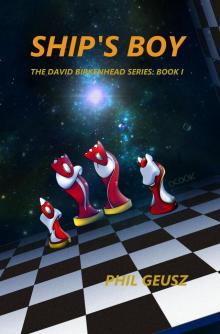 Ship's Boy
Ship's Boy Early Byrd
Early Byrd Admiral (The David Birkenhead Series)
Admiral (The David Birkenhead Series)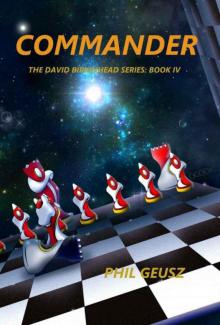 Commander
Commander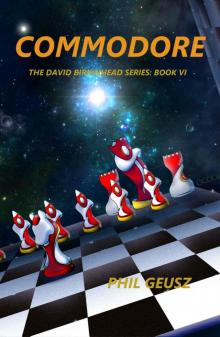 Commodore (The David Birkenhead Series)
Commodore (The David Birkenhead Series)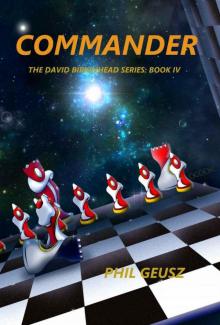 Commander (The David Birkenhead Series)
Commander (The David Birkenhead Series)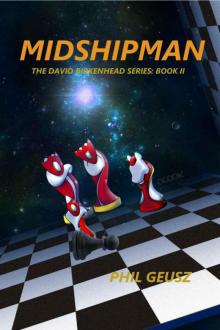 Midshipman
Midshipman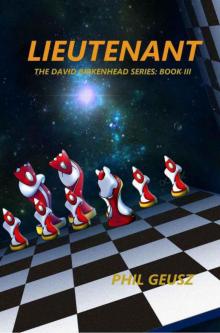 Lieutenant
Lieutenant Ship's Boy (The David Birkenhead Series)
Ship's Boy (The David Birkenhead Series)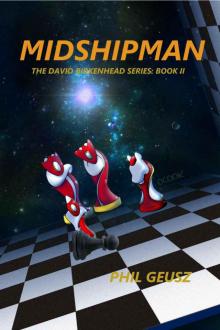 Midshipman (The David Birkenhead Series)
Midshipman (The David Birkenhead Series)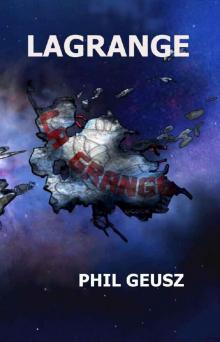 Lagrange
Lagrange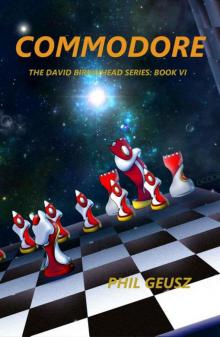 Commodore
Commodore Admiral
Admiral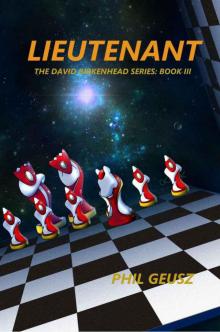 Lieutenant (The David Birkenhead Series)
Lieutenant (The David Birkenhead Series)